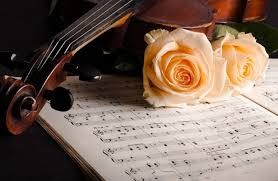RUSSIAN OPERA
VERSION FRANCAISE DISPONIBLE. VEUILLEZ CLIQUER SUR L'ICONE (BAS DE PAGE)
DEFINITION
Russian opera was encouraged by Catherine the Great, who in 1783 ordered the new Bolshoi Theatre in St. Petersburg to perform as many operas as plays.
It was Glinka who inaugurated Russian romantic opera in 1836 with "A Life for the Tsar".
He was followed by Mussorgsky, Borodin, Rimsky-Korsakov and Tchaikovsky.
Russian opera draws mainly on Russian folklore and history. Pushkin, considered the founder of Russian literature, provided the plot for many of the Russian operas of this period.
GLINKA (1804-1857)
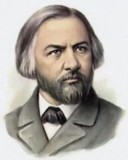
Mikhail Ivanovich Glinka is the founder of the modern Russian musical school. He is a contemporary and friend of Alexander Pushkin, whom he met in 1828, and of Nikolai Gogol.
Glinka was born on June 1, 1804 in Novospasskoye, Russia.
From 1830 to 1833 he travelled to Italy where he discovered the operas of Bellini, Donizetti and Rossini, which inspired various compositions.
From October 1833 to April 1834 he was in Berlin where he studied counterpoint.
Back in Russia, he decided to build a new harmony based on the particularities of Russian folk songs.
He then began working on a Russian opera, " A Life for the Tsar " (originally called "Yvan Susanin"), whose historical subject was proposed by the poet Zhukovsk: At the beginning of the 12th century, a peasant, Yvan Susanin, saves the future Tsar Michael Romanov by sacrificing his own life. Glinka introduced a typical musical language by using tone scales, oriental scales, etc., and by favoring songs and dances from Russian folklore.
The opera was premiered at the Marinsky Theatre in the presence of the Tsar on December 9, 1836, and was a huge success.
From 1837 to 1839, Glinka was choirmaster at the Imperial Chapel.
Following on from his first success, he planned a second opera for which he chose a work by Pushkin,
From 1844 to 1847, Glinka stayed in Paris where he became friends with Berlioz, then in Spain where he studied Spanish folklore.
He left for Berlin in 1856 to study religious music, where he died on February 15, 1857.
Besides his operas, Glinka is the author of numerous instrumental works including: His string quartet in F major (1829), His fantasy waltz for piano (1839).
And especially his fantasies for orchestra such as the Jota aragonaise (1845), Summer Night in Madrid (1848), Kamarinskaya (1848).
Among Glinka's main successors we can cite Alexander Dargomyzhsky (" Rusalka "), and especially the group of five .
BORODINE (1833-1887)
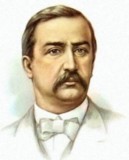
Borodin wrote only one opera, Prince Igor , which he never finished. In 1886, as he was about to finish his opera, he collapsed and died at a costume ball.
Glazunov completed the work with the parts he had heard Borodin play on the piano, and Rimsky-Korsakov took charge of the orchestration.
"Prince Igor" is most famous for its Polovtsian dances, which are often performed separately in concerts.
THE GROUP OF FIVE
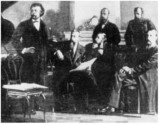
The Group of Five was founded by Mili Balakirev, who brought together Nikolai Rimsky-Korsakov, Alexander Borodin, Modest Mussorgsky and Cesar Cui.
They want to create a national Russian music, opting for the most expressive genres: opera, ballet, and symphonic music.
We will meet the group of five within the framework of national schools.
For our purposes here, we will focus on the main operas written by these composers.
RIMSKY-KORSAKOV (1844-1908)
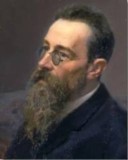
Rimsky-Korsakov was the most influential and best-known member of the Group of Five, and orchestrated several works by other members after their deaths. A Russian composer and music theorist, he was also a professor of music, harmony, and orchestration at the St. Petersburg Conservatory.
Rimsky-Korsakov is the author of about twenty operas, including " Snegurochka " (The Snow Maiden) (1898) which was his favorite work, " Sadko " (1898), " The Tsar's Bride " (1899), " The Legend of Tsar Saltan " (1900) in which we can hear the famous " Flight of the Bumblebee " and " The Golden Cockerel " (1909), his last opera.
TCHAIKOVSKY (1840-1893)
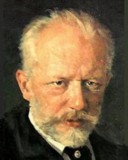
Pyotr Ilyich Tchaikovsky is best known for his ballet music, symphonies and concertos. He also wrote about ten operas, two of which have remained opera standards: " Eugene Onegin " (1879) and " The Queen of Spades " (1890), inspired by Pushkin.
In both operas, Tchaikovsky's European-influenced music combines Western music with Russian elements.
His other operas are: "The Voivode" (1869), " Oprichnik " (1874), " The Maid of Orleans" (1881), " Mazeppa " (1884), "Cherevichki" (1887), "The Enchantress" (1887), " Iolanta " (1892)
We will meet Tchaikovsky again in the context of national schools.



